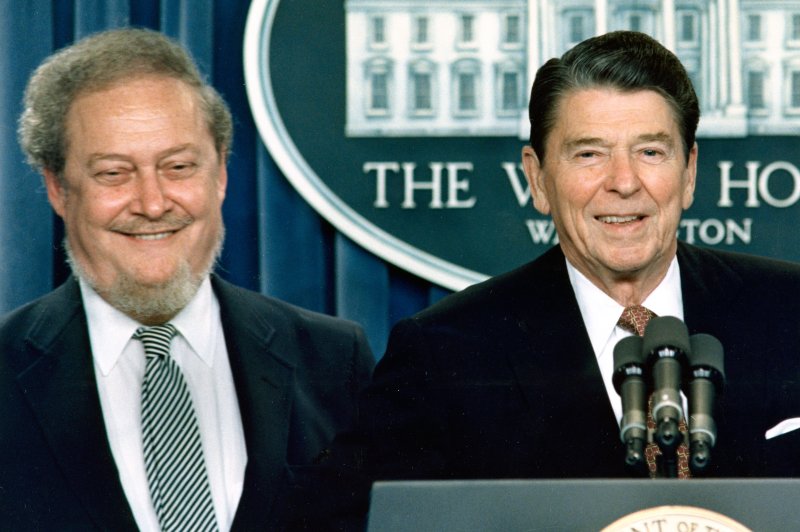1 of 4 | President Ronald Reagan (R) tells reporters on July 1, 1987, he is nominating Judge Robert Bork to fill the vacancy on the U.S. Supreme Court. On October 23, the U.S. Senate rejected President Ronald Reagan's nomination of Robert Bork to the Supreme Court by the biggest margin in history, 58-42. File Photo by Vince Mannino/UPI |
License Photo
Oct. 23 (UPI) -- On this date in history:
In 1707, the British Parliament met for the first time after the Treaty of Union dissolved both the Parliaments of England and Scotland and created a new Kingdom of Great Britain. The Parliament of Great Britain eventually became the Parliament of the United Kingdom.
In 1915, an estimated 25,000 women marched in New York City demanding the right to vote throughout the United States.
In 1942, the British Eighth Army launched an offensive at El Alamein in Egypt, a World War II battle that eventually swept the Germans out of North Africa.
In 1945, Jackie Robinson, the first black baseball player hired by a major league team, was signed by the Brooklyn Dodgers and sent to their Montreal farm team. He moved up to the Dodgers in 1947 and became one of the sport's greatest stars.
A sculpture of Jackie Robinson is part of the sports exhibit at the Smithsonian National Museum of African American History and Culture on September 14, 2016 in Washington, D.C. File Photo by Pat Benic/UPI
In 1946, the United Nations General Assembly convenes for the first time, at an auditorium in Flushing, Queens, New York City.
In 1962, President John F. Kennedy signs Proclamation 3504, authorizing the naval blockade of Cuba following the discovery of Soviet missiles on the island.
In 1972, earthquakes killed more than 10,000 people in Nicaragua.
In 1983, suicide bomb attacks on peacekeeping troops in Beirut killed 241 U.S. Marines and 58 French soldiers. Warnings ignored, defenses left vulnerable in attack on Marines in Lebanon.
In 1987, the U.S. Senate rejected U.S. President Ronald Reagan's nomination of Judge Robert Bork to the U.S. Supreme Court by the biggest margin in history, 58-42.
In 1989, Hungary formally declared an end to 40 years of communist rule and proclaimed itself a republic, setting the stage for creation of Western-style democracy in the Eastern Bloc state.
In 1995, the U.S. Defense Department announced it was ending a program designed to help minority-owned firms secure government contracts.
In 1998, Dr. Barnett Slepian, an obstetrician who performed abortions, was killed by a sniper who fired a bullet through a window of Slepian's home in Amherst, N.Y.
In 2005, a Nigerian plane crashed shortly after takeoff from Lagos, killing all 117 people aboard.
In 2006, Panamanians voted overwhelmingly to support a proposal to expand the Panama Canal to allow larger ships to pass through.
File Photo by Library of Congress/UPI
In 2008, former Federal Reserve Chairman Alan Greenspan told a U.S. House committee the United States is "in the midst of a once-in-a-century credit tsunami" that left him in a state of "shocked disbelief."
In 2010, Prime Minister David Thompson of the Caribbean nation of Barbados died of pancreatic cancer. He was 48.
In 2011, southeastern Turkey was struck by a 7.2-magnitude earthquake that killed more than 600 people and injured about 4,100.
File Photo by Maryam Rahmanian/UPI


















